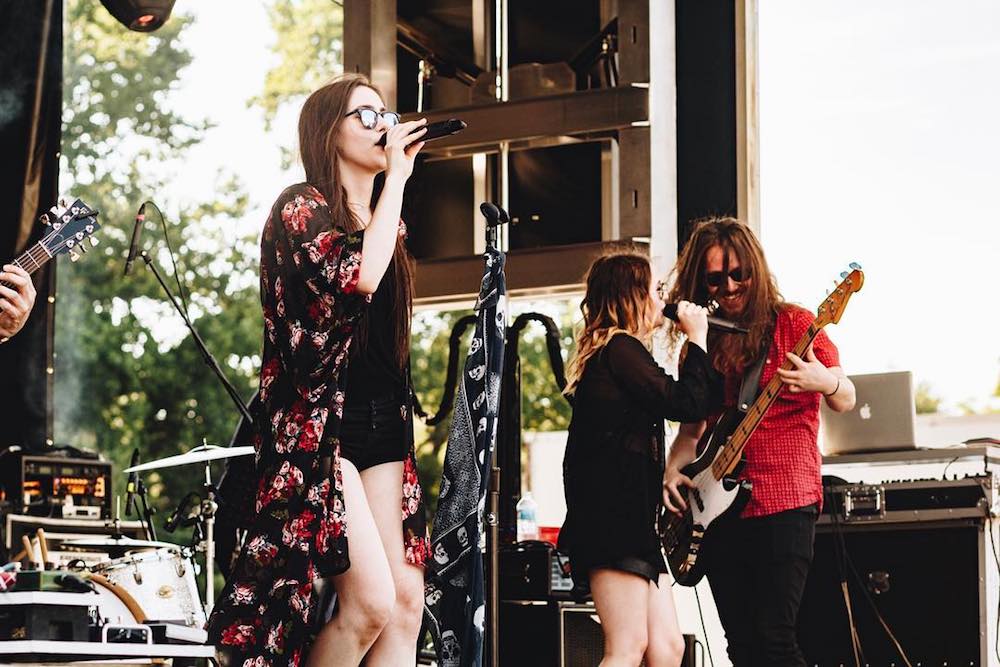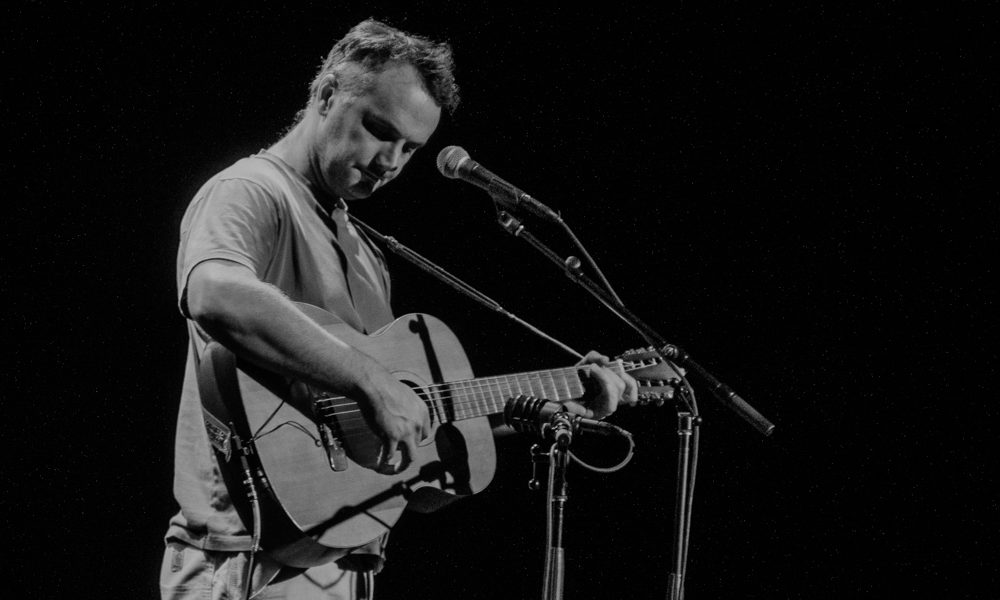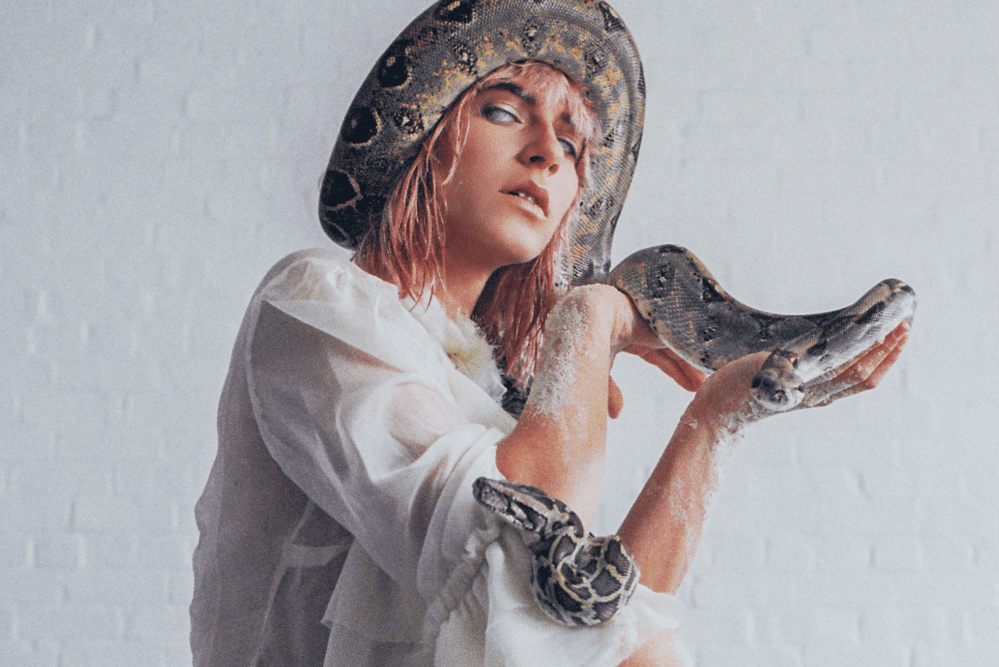

ONLY NOISE explores music fandom with poignant personal essays that examine the ways we’re shaped by our chosen soundtrack. This week, Luci Turner takes stock of the trials, tribulations and triumphs she’s experienced as a young woman working in the music industry.
Life in the music industry isn’t easy. As Hunter S. Thompson said, “The music business is a cruel and shallow money trench, a long plastic hallway where thieves and pimps run free, and good men die like dogs. There’s also a negative side.” What Thompson never had to face, however, was a drunk fan telling him to smile more, or attempting to grope him behind the merch stand.
As an indie musician, music journalist, and editor by trade, and publicist, social media manager, band manager, tour promoter, head of merchandising, marketing team, and handler by necessity, I’ve worked on every side of the industry, accomplished tasks I never thought I’d have to out of absolutely necessity, and learned skills I probably would’ve been just as happy never learning. I’ve seen the good, the bad, and the really ugly: the unfortunate (read: nonexistent) restroom situation at an off-road mud park in the middle of nowhere in south Georgia; the incident involving a very intoxicated young man who managed to land himself in a trash can in an attempt to get an arm around my sister’s waist; the Gollum-esque man who got a nice grip on my right buttocks and proceeded to tell me, “No, it’s okay. I’ve got daughters.” Obviously that did not make it okay, and I’ve still got questions.
As I look back on these occurrences, it’s obvious that despite the advances made over the decades, the music industry is, in many ways, still a man’s world. But my belief — and my hope — is that, with the music itself as an equalizer, it doesn’t have to be this way.
I grew up in a very small town, a back-pew Baptist born with the somewhat shameful affliction of being a female. I learned to sit down, cover up, and keep my mouth shut at a young age, because that was what was acceptable and expected. I learned to cross my legs and hold my tongue, and I learned at the age of ten that I had to stand farther away from the microphone because I could belt out a song with greater volume and enthusiasm than the boys in the choir.
But my “alternative education,” as I call the music my father exposed my siblings and me to, told a different story. There was power to be found in being a woman; pride, even. I remember seeing photos of Debbie Harry, clad in short, skin tight dresses or ratty oversized t-shirts, her hair bleached an impossible shade of white and her eyes lined with heavy black liner, glamorous and provocative and undeniably female, and thinking, “I want to be just like her one day.” She was strong, fearless, bold, and utterly unconcerned with what anyone thought of her. She was the antithesis of what a Southern Baptist girl should aspire to be.
Debbie Harry opened a door for me. In fact, she blew the whole house up and put a whole new world on display. As I listened to Blondie obsessively and began to discover other bands fronted by powerful women — Joan Jett and the Blackhearts, Heart, Patti Smith — I couldn’t help but wonder why it had taken me twelve years to discover them. Didn’t anyone ever wonder where the women were when listening to the classic rock stations? My exposure to rock wasn’t limited, so why were all of my favorite bands comprised solely of men? Hearing “Heart of Glass” for the first time was so impactful that it startled me, even at such a young age, with the realization that so few women were represented on the radio, or in the pile of CDs hidden away in a spare closet.
Years later, as my sister and I made our way into the music industry as singer-songwriters fronting a rock band, that realization — and the questions it sparked — never left the back of my mind. As we found ourselves leading a band of four young men, working with male producers and engineers, and dealing with various managers/snake oil salesmen looking for a quick buck and a plane ticket to Australia, Los Angeles, or New York, we were constantly reminded that we were girls — young girls, with little experience, no technical training, and no family or friends in the industry who knew the business and had already walked the path. But at the same time, we found ourselves in the precarious situation of being forced to learn our own lessons, own up to our mistakes, and take ownership of the victories, despite the producer who made a point to exclaim, “Who’s your daddy?” in the moments where tensions rose and creative control was questioned.
Looking back, I still remember the sickening realization that I would never be considered an equal by that producer. His words spun around in my mind, infuriating, subjugating, and disrespectful. Would he have said “Who’s your daddy?” to a man — regardless of age — or simply considered the options and allowed the artist to follow his gut? We were faced with a similar maddening situation on the stage, as well, in a group of men hired to back us. All four were older, if only by a few years, set on holding their experience, credentials, and manly wisdom over the heads of two young women who, in their opinion, lacked everything but marketability.
We weren’t considered equals. We were “the girls” — a product to be sold — and they were the musicians. We couldn’t possibly have the same knowledge, connection, or love of music; we were too young and too female. It was an attitude enforced by management, of systematic inequality and a lifelong belief that to be male was to be more: powerful, intelligent, worthy. It was with that group, however, that my sister and I experienced the most growth, because we were constantly and consistently challenged. There were private moments of great frustration, when I felt like I was either going to burst into tears or lose my temper, because it could never be easy; our opinions were always questioned, our ideas met with egos.
Letting that group of players go was one of the most relieving moments of my life, but the endurance and sheer tenacity it created in me was one of the greatest gifts I’ve ever received. Still, though, I had no answer to the question that haunted the back of my mind: where were the women, and what would happen if, instead of having to prove ourselves to men, we were surrounded and supported by other women?
That question was answered, at least partially, in the span of a few short months, as we became more involved in the Atlanta music scene. We were befriended by musicians of every age — male and female — who made one thing very clear: there, and on stages across the country, we weren’t “the girls from Waycross.” All that mattered was the music and what we could do with it.
The playing field was level when it came to the music. Worth was based on how good we were, how passionate we were, how willing we were to look foolish, make mistakes, and feel vulnerable, not our age or gender. Money and marketing teams can’t change that. Radio directors and talent buyers can’t, either, and while the issue of women’s presence on the radio, at festivals, and in the music industry as a whole — not only as artists, but as producers, engineers, journalists, and executives — demands to be addressed and improved, in my heart, there’s only one reason that it matters at all.
In music, we are equal. Not in the festival lineups, the radio play, or the mindsets of too many — not yet — but we’ve tasted and felt the equality that some of us may have never known before. Once you get a taste of it, there’s no satisfying the hunger. As long as there’s music to be played, there will be women fighting for their place on the stage, men and women who rally around us and stand beside us, and generations of songwriters coming behind us, ready to prove again and again the revolutionizing, unifying, unspeakable power of music.
While music, at its core, is equalizing, there’s a long way to go in equality for women in the music industry. For more information, check out these 5 Women in Music Organizations to get involved.




